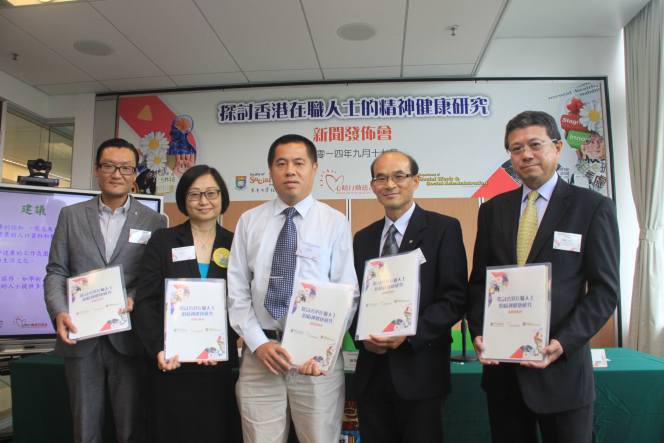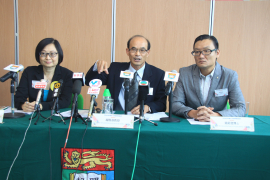Media
HKU released findings on
“Knowledge, Attitude, Practices about Mental Health
at the Hong Kong Workplace”
17 Sep 2014
(From left) Dr Paul Wong Wai-ching, Ms Cecilia Chiu, an employee in the Hong Kong workforce Kenneth, Professor Samson Tse Shu-ki and International law firm Baker & McKenzie Managing Partner Mr. Paul Tan present the research findings on mental health at the Hong Kong workplace and join the experience sharing session.
As commissioned by the Joyful (Mental Health) Foundation (JMHF), the Department of Social Work and Social Administration of the Faculty of Social Sciences, The University of Hong Kong (HKU) had conducted the first academic study on mental health status, mental health related knowledge, attitudes, and behaviors among the working population in Hong Kong. The study explored the issues affecting the mental health status of working people so as to devise a friendly mental-health working environment for the working population.
The research findings were presented by Professor Samson Tse Shu-ki and Dr Paul Wong Wai-ching of HKU, together with Ms Cecilia Chiu, the Vice-Chairperson of the JMHF at a press conference. Ms Victoria Lam Kin-ming, the Founder and Chairperson of the JMHF also attended the press conference. An employee in the Hong Kong workforce and a representative from the International law firm Baker & McKenzie joined the experience sharing session.
The study aimed to examine the knowledge, attitude, and behavior about mental health and mental health status of individuals who were 18 years old or above and who had worked for more than 20 hours in the previous week before the interview. A cross-sectional telephone survey was conducted between March and June 2014 by researchers from the Social Science Research Centre, HKU, and successfully contacted 1,031 participants. The distribution of the respondents in different industries was similar to the Hong Kong 2011 Population Census. The industries include community, social and personal services (28.1%), finance, insurance, estate, and other commercial services (15.6%), transport (11.8%), import, export, wholesale, retail (11.4%) and construction (11.3%) industries.
The research findings showed that the knowledge on mental illness among the working population is better than anticipated and the majority of them agreed that mental illness could be helped by psychotherapies. More than 50% of the participants stated that they were willing to work with people with mental health problems. However, Dr. Wong pointed out that despite the mental health knowledge among the working population in Hong Kong was good and had a positive attitude towards people with mental health problems, their mental health status required our due attention. Furthermore, almost a quarter of our participants were bothered by feeling down, depressed, or hopeless in the past month. About one-third of our participants were bothered by having little interest or pleasure in doing things and worrying in the past month. Participants who work as professional and elementary workers may need more attention about their mental health.
There was no economic evaluation of the consequences of mental illnesses among the working population in Hong Kong. Professor Samson Tse said, “If we were more aware of the economic consequences of the impact of mental health problems on the working people, we may like to consider developing more mentally-friendly workplaces for employees”. In order to improve the situation, Professor Tse also recommended 1) to set up a monitoring standard about knowledge, attitude, and practices towards mental health and the mental health status of the public to provide reliable data for policy planning 2) to encourage more multi-sectorial collaboration, i.e, academic, corporate, NGOs, in creating more support and opportunities for people with mental health issues at different stages
Ms Cecilia Chiu stressed that JMHF has long been promoting mental health knowledge to the public since its establishment 10 years ago. Unfortunately, there was no systematic and cross-sectional research in studying the mental illnesses. The lack of information posed difficulty for us to provide appropriate education and services to the needy people. As human resource is the core asset of a society, it is hoped that the society put more concern on the mental health situation of our workforces.
For details about the research, please click here.
For supplementary information on mental health, please click here.
For media enquiries, please contact
Mr. Nathaniel Lam, JMHF (Tel: 3188 4408; email: nathaniellam@jmhf.org)
Miss Rhea Leung, Communication and Public Affairs Office, HKU (Tel:2857 8555 / 9022 7446; email: rhea.leung@hku.hk)
Miss Vanessa Sit, Faculty of Social Sciences, HKU (Tel: 3917 1203 / 9267 8877; email: vansit@hku.hku)
About Joyful (Mental Health) Foundation (www.jmhf.org)
Joyful (Mental Health) Foundation is a registered non-profit-making charitable organization established by Ms Victoria Lam, who once suffered from depression and emotional disorders in 2004, together with a group of enthusiastic volunteers. According to a 2001 report by the World Health Organization (WHO), about one-quarter of the world’s population suffers from mood disorders to various degrees; furthermore, a 2012 WHO report adds that more than 350 million people worldwide suffer from depression. Depression has become a common mood disorder, and it is estimated that by the year 2030, depression may become the greatest medical burden faced by many countries.
The public still has many misunderstandings about mood disorders. As a result, many patients suffering from mood disorders fail to receive proper treatment in time; some even lose their precious lives to it. Therefore, the Foundation engages in promoting greater knowledge of mood disorders; reducing misunderstanding and discrimination; and providing counseling resources and assistance to patients and their families.
About Faculty of Social Sciences, HKU (www.socsc.hku.hk)
The Faculty of Social Sciences was established in 1967 and has undergone rapid expansion and significant transformation since then. Through 45 years of development, the Faculty has become one of the leading schools in social sciences education and research globally. In 2013/14, we are ranked first in Asia and 39th in the world according to the Times Higher Education World University Rankings.
The Faculty comprises five departments and seven multidisciplinary research centres that provide a platform for interdisciplinary research and collaboration. Through our focus on social innovation and global citizenship we also seek to contribute to the advancement of society and the development of leaders locally, regionally, and globally. The Faculty is committed to building a strong research culture and has achieved recognition in three strategic research areas that seek to grow: the study of NGOs and Civil Society; China Studies; and Social and Cognitive Neuroscience. Faculty members publish in high impact academic journals and undertake a wide range of contract research focusing on public policy.
The Faculty has been a leader in knowledge exchange for the local and regional communities through activities such as public lecture series, academic seminars, professional workshops, media presentations, student internship programmes, consultancy services and taught postgraduate programmes. Many colleagues participate in policy making bodies and provide advice to government bodies and other public organisations.


